It looks like you're using an Ad Blocker.
Please white-list or disable AboveTopSecret.com in your ad-blocking tool.
Thank you.
Some features of ATS will be disabled while you continue to use an ad-blocker.
share:
Those that do not learn from history are doomed to repeat it.
The history of the UFO field has many, many examples (some of which I’ve collated below) of predictions of imminent official disclosure of the existence of alien visitors. Headlines claiming that UFO “Disclosure” is coming soon have been made by popular UFO authors and lecture-circuit speakers for decades. Specific dates or time period (often measured in mere months) until the grand revelation of the Truth have been common but all such predictions have failed.
Even those that support the view that at least some UFO sightings probably have some exotic cause (whether aliens, time travellers, inter-dimensional beings or some other non-mundane explanations) have recognised the frequency of such failed predictions of Disclosure.
For example, Richard Dolan has written that “Since the beginning of the UFO cover-up, interested observers have expected an imminent disclosure … The feeling that Disclosure is imminent surfaces every few years, like Ahab’s White Whale” (in his book “A D : After disclosure”, Chapter 3).
Similarly, journalist George Knapp has been reported as saying that every year since he has been following the UFO topic he has “heard predictions and pronouncements that this was the year when the government was going to throw up the hangar doors, show where they’ve been hiding the flying saucers, and finally come clean. It never happens” (in an article entitled “Friend or UFO?” in the Charlottesville “Daily Progress” newspaper on 31 January 1999; republished in the “UFO Newsclipping Service” issue number 356, 1993 March).

Some skeptical researchers and those with an interest in sociological aspects of the history of this subject have previously collated some examples of such predictions (particularly Martin S Kottmeyer, Robert Sheaffer, Phil Klass, and Ulrich Magin – cited in relation to some of the examples below). Robert Sheaffer, one leading skeptic, has commented that “UFO proponents have mercifully short memories when it comes to recalling embarrassing predictions they have made of an approaching end of UFO secrecy” (in his book “UFO Sightings”, at page 164).
I have collated numerous examples of such predictions below, with a focus on predictions which gained the most publicity. (I have not sought to include every Internet blog post that has suggested Disclosure may be imminent). The list is, I am absolutely certain, far from comprehensive. I have vague recollections of many similar statements but only wanted to include predictions for which I could find precise details.
These examples are, I hope, sufficient to illustrate some of the tendencies in the UFO field that have resulted in some failed predictions. In relation to many of these failed predictions of imminent Disclosure, the reasons for the prediction were given.
Most of reasons given as the basis of these predictions can be grouped together as follows:
(1) A perceived recent increase in the frequency of UFO sightings and/or media coverage of sightings. UFO sightings have long been recognised as appearing come in “waves” or “flaps”. (The explanations for this are rather contentious, with theories having been put forward over the last few decades ranging from the sociological to the astronomical). The facts surrounding the predictions below indicate that it has been fairly common for a wave of sightings to be viewed as heading towards some sort of climax. That climax has been perceived in relation to many of the predictions below as grounds for considering that an official recognition of UFOs is inevitable within a matter of months. (Such waves have also caused many predictions that open landings of UFOs will take place in the relatively near future – but that’s another story).
(2) A perceived recent increase in the frequency of media coverage of UFO sightings (or the respectability of the media coverage, e.g. particular newspapers covering the recent). This is closely related to the above point and similar has often involved a form of extrapolation. Patterns have been perceived (arguably a form of apophenia, which have formed the basis of a belief that governments will soon be compelled to admit the Truth.
(3) A perceived increased in releases of documents or comments by government officials or others (including scientists and the Vatican) on issues relating to extraterrestrial life, and/or media coverage of such releases. In the context of the failed predictions below, those releases have often been viewed as the early stages of a “program to prepare the American people” and a perceived trend has been extrapolated by some researchers to a full disclosure of the existence of aliens within a short period.
(4) Information allegedly provided by government “insiders”. In most cases, the relevant “insiders” are unnamed and/or said to be confidential. In relation to many such instances, given the failure of the relevant prediction, it is reasonable to question (in the light of any evidence to the contrary) the alleged source even existed. However, in a few instances the relevant UFO researcher has been relatively credible or named a source. The failure of the relevant predictions in the latter instances provide cause for caution when approached by any “insider” as to whether they were in fact in a position to gain the knowledge they allege to possess and/or whether they are trying to deceive the relevant UFO researcher (and, through them, the public or potentially other governments).
(5) Purported psychic insights : Psychics have, um, a poor record in relation to their predictions of imminent UFO disclosure…
Apart from providing some insight into the causes of such predictions (and lessons to be learnt from the errors made in relation to them), the examples below also indicate some effects from such predictions. Notably, the failure of such predictions has rarely (if ever) appeared to have adversely impacted the support for the person making the prediction.
(This will probably not be a surprise to those familiar with the book “When Prophecy Fails” by Leon Festinger et al).
Taking one of the earliest examples below (Donald Keyhoe, 1950), the making of a prediction in Keyhoe’s first book which subsequently failed did not prevent that book (and subsequent books by Keyhoe) having considerable success, or prevent his group (NICAP) being viewed as one of the more influential and credible groups in the history of ufology.
Several others that have made predictions in the examples below appear to have gained considerable publicity as a result of their claims, with little if any adverse effects on their perceived credibility when their predictions failed (or, indeed, much comment or questioning about the grounds for any sensational claims they had made that proved to be ill-founded).
Unfortunately, this arguably indicates that being right (or even ensuring you have credible evidence before making incredible claims) is less important in ufology than merely being entertaining.
(These points should not, of course, be taken as suggesting that governments and skeptics are always correct in their statements. At some point, I really should post details of various statements by government officials regarding UFOs with proof they are untrue).
The history of the UFO field has many, many examples (some of which I’ve collated below) of predictions of imminent official disclosure of the existence of alien visitors. Headlines claiming that UFO “Disclosure” is coming soon have been made by popular UFO authors and lecture-circuit speakers for decades. Specific dates or time period (often measured in mere months) until the grand revelation of the Truth have been common but all such predictions have failed.
Even those that support the view that at least some UFO sightings probably have some exotic cause (whether aliens, time travellers, inter-dimensional beings or some other non-mundane explanations) have recognised the frequency of such failed predictions of Disclosure.
For example, Richard Dolan has written that “Since the beginning of the UFO cover-up, interested observers have expected an imminent disclosure … The feeling that Disclosure is imminent surfaces every few years, like Ahab’s White Whale” (in his book “A D : After disclosure”, Chapter 3).
Similarly, journalist George Knapp has been reported as saying that every year since he has been following the UFO topic he has “heard predictions and pronouncements that this was the year when the government was going to throw up the hangar doors, show where they’ve been hiding the flying saucers, and finally come clean. It never happens” (in an article entitled “Friend or UFO?” in the Charlottesville “Daily Progress” newspaper on 31 January 1999; republished in the “UFO Newsclipping Service” issue number 356, 1993 March).

Some skeptical researchers and those with an interest in sociological aspects of the history of this subject have previously collated some examples of such predictions (particularly Martin S Kottmeyer, Robert Sheaffer, Phil Klass, and Ulrich Magin – cited in relation to some of the examples below). Robert Sheaffer, one leading skeptic, has commented that “UFO proponents have mercifully short memories when it comes to recalling embarrassing predictions they have made of an approaching end of UFO secrecy” (in his book “UFO Sightings”, at page 164).
I have collated numerous examples of such predictions below, with a focus on predictions which gained the most publicity. (I have not sought to include every Internet blog post that has suggested Disclosure may be imminent). The list is, I am absolutely certain, far from comprehensive. I have vague recollections of many similar statements but only wanted to include predictions for which I could find precise details.
These examples are, I hope, sufficient to illustrate some of the tendencies in the UFO field that have resulted in some failed predictions. In relation to many of these failed predictions of imminent Disclosure, the reasons for the prediction were given.
Most of reasons given as the basis of these predictions can be grouped together as follows:
(1) A perceived recent increase in the frequency of UFO sightings and/or media coverage of sightings. UFO sightings have long been recognised as appearing come in “waves” or “flaps”. (The explanations for this are rather contentious, with theories having been put forward over the last few decades ranging from the sociological to the astronomical). The facts surrounding the predictions below indicate that it has been fairly common for a wave of sightings to be viewed as heading towards some sort of climax. That climax has been perceived in relation to many of the predictions below as grounds for considering that an official recognition of UFOs is inevitable within a matter of months. (Such waves have also caused many predictions that open landings of UFOs will take place in the relatively near future – but that’s another story).
(2) A perceived recent increase in the frequency of media coverage of UFO sightings (or the respectability of the media coverage, e.g. particular newspapers covering the recent). This is closely related to the above point and similar has often involved a form of extrapolation. Patterns have been perceived (arguably a form of apophenia, which have formed the basis of a belief that governments will soon be compelled to admit the Truth.
(3) A perceived increased in releases of documents or comments by government officials or others (including scientists and the Vatican) on issues relating to extraterrestrial life, and/or media coverage of such releases. In the context of the failed predictions below, those releases have often been viewed as the early stages of a “program to prepare the American people” and a perceived trend has been extrapolated by some researchers to a full disclosure of the existence of aliens within a short period.
(4) Information allegedly provided by government “insiders”. In most cases, the relevant “insiders” are unnamed and/or said to be confidential. In relation to many such instances, given the failure of the relevant prediction, it is reasonable to question (in the light of any evidence to the contrary) the alleged source even existed. However, in a few instances the relevant UFO researcher has been relatively credible or named a source. The failure of the relevant predictions in the latter instances provide cause for caution when approached by any “insider” as to whether they were in fact in a position to gain the knowledge they allege to possess and/or whether they are trying to deceive the relevant UFO researcher (and, through them, the public or potentially other governments).
(5) Purported psychic insights : Psychics have, um, a poor record in relation to their predictions of imminent UFO disclosure…
Apart from providing some insight into the causes of such predictions (and lessons to be learnt from the errors made in relation to them), the examples below also indicate some effects from such predictions. Notably, the failure of such predictions has rarely (if ever) appeared to have adversely impacted the support for the person making the prediction.
(This will probably not be a surprise to those familiar with the book “When Prophecy Fails” by Leon Festinger et al).
Taking one of the earliest examples below (Donald Keyhoe, 1950), the making of a prediction in Keyhoe’s first book which subsequently failed did not prevent that book (and subsequent books by Keyhoe) having considerable success, or prevent his group (NICAP) being viewed as one of the more influential and credible groups in the history of ufology.
Several others that have made predictions in the examples below appear to have gained considerable publicity as a result of their claims, with little if any adverse effects on their perceived credibility when their predictions failed (or, indeed, much comment or questioning about the grounds for any sensational claims they had made that proved to be ill-founded).
Unfortunately, this arguably indicates that being right (or even ensuring you have credible evidence before making incredible claims) is less important in ufology than merely being entertaining.
(These points should not, of course, be taken as suggesting that governments and skeptics are always correct in their statements. At some point, I really should post details of various statements by government officials regarding UFOs with proof they are untrue).
edit on 20-5-2020 by
IsaacKoi because: (no reason given)
1950 – Donald Keyhoe
Donald Keyhoe stated in his 1950 book “The Flying Saucers Are Real” (at the end of Chapter 1) that he believed there was a “an elaborate program to prepare the American people for a dramatic disclosure”. He thought that the program, and “even the wide deceit involved” would be seen as justified when the official explanation was revealed.
Keyhoe concluded the relevant chapter by stating that he thought that the official explanation “may be imminent”.
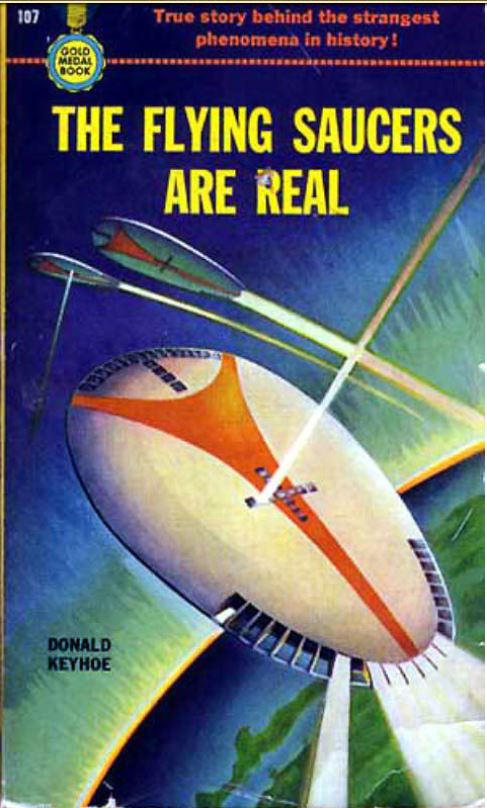
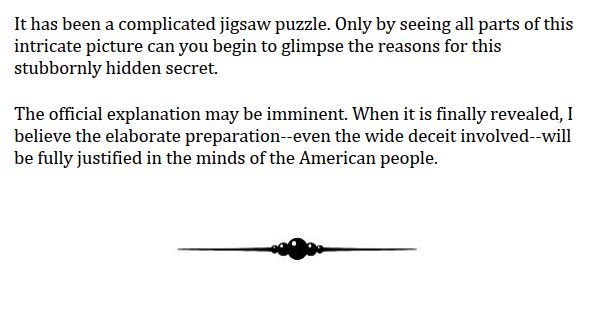
Mentioned by Martin S Kottmeyer in his article “Still Waiting: A List of Predictions from the ‘UFO Culture’ ”, available online HERE
1952 - Walter Winchell
On 30 June 1952, Walter Winchell - then a columnist well known in America - stated that scientists at Palomar Observatory, California, were supposed to have seen a ‘space ship’ land in the Mojave Desert. Four persons stepped out, took one look, and went off again.
He stated that “The U.S. Army may officially announce it in the fall.”
This statement was reported in H T Wilkins’ book “Flying Saucers on the Attack Ace Star”, 1967 at page 267 of the Citadel Press edition – at page 291 of 368 of the PDF version.

Mentioned by Martin S Kottmeyer in his article “Still Waiting: A List of Predictions from the ‘UFO Culture’ ”, available online HERE
1953 - Edgar Plunkett
Edgar Plunkett, the British representative of the International Flying Saucer Bureau wrote the following in his introductory message in the January 1953 issue of Albert Bender’s newsletter “Space Review” :
“Are we on the threshold of a breathtaking discovery? I mean yes!”.
The relevant item ended with a call for members of the group to “carry on the good work, and above all, do not be disappointed, discouraged or deluded by the jeers and sneers of the ignorant so-called majority”.

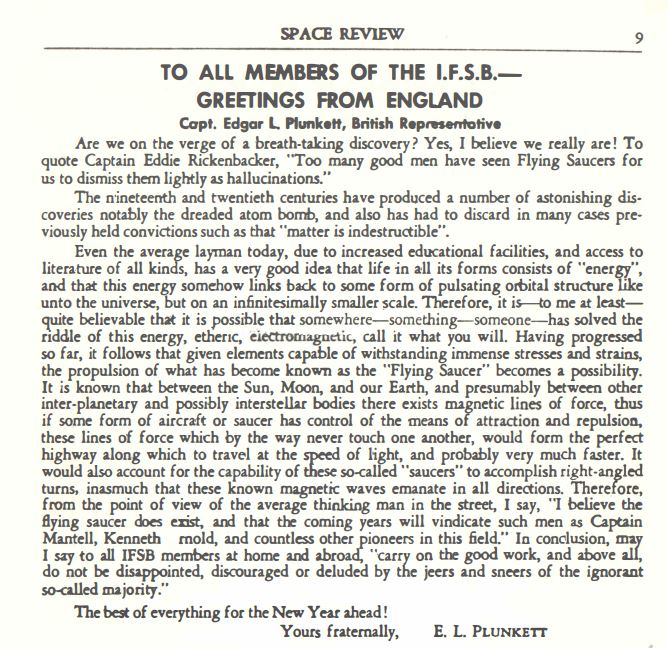
Published in Albert Bender’s newsletter “Space Review” in the issue for January 1953 (Volume II Number 1) on page 9.
Republished in Albert K Bender’s booklet “Space review: Complete File”, at page 23 of 59 in the PDF version.
Mentioned by Martin S Kottmeyer in his article “Still Waiting: A List of Predictions from the ‘UFO Culture’ ”, available online HERE
Mentioned by Ulrich Magin in his German-language article "Wir sind knapp davor..." in JUFOF Issue 232 (2017) at pages 112-115 (at pages 18-20 of the PDF version).
edit on 20-5-2020 by IsaacKoi because: (no reason given)
1953 – Albert Bender
Albert K. Bender claimed in October 1953 that he had been visited by three Men-In-Black and told that the U.S. Government would reveal the secret of the UFOs in either 5 months or 4 years.
Jerome Clark has commented that Bender proved to be “a poor prophet”.
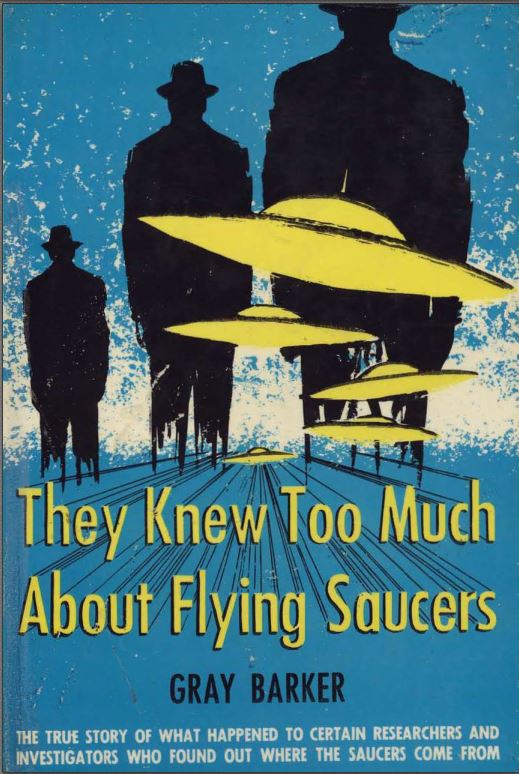
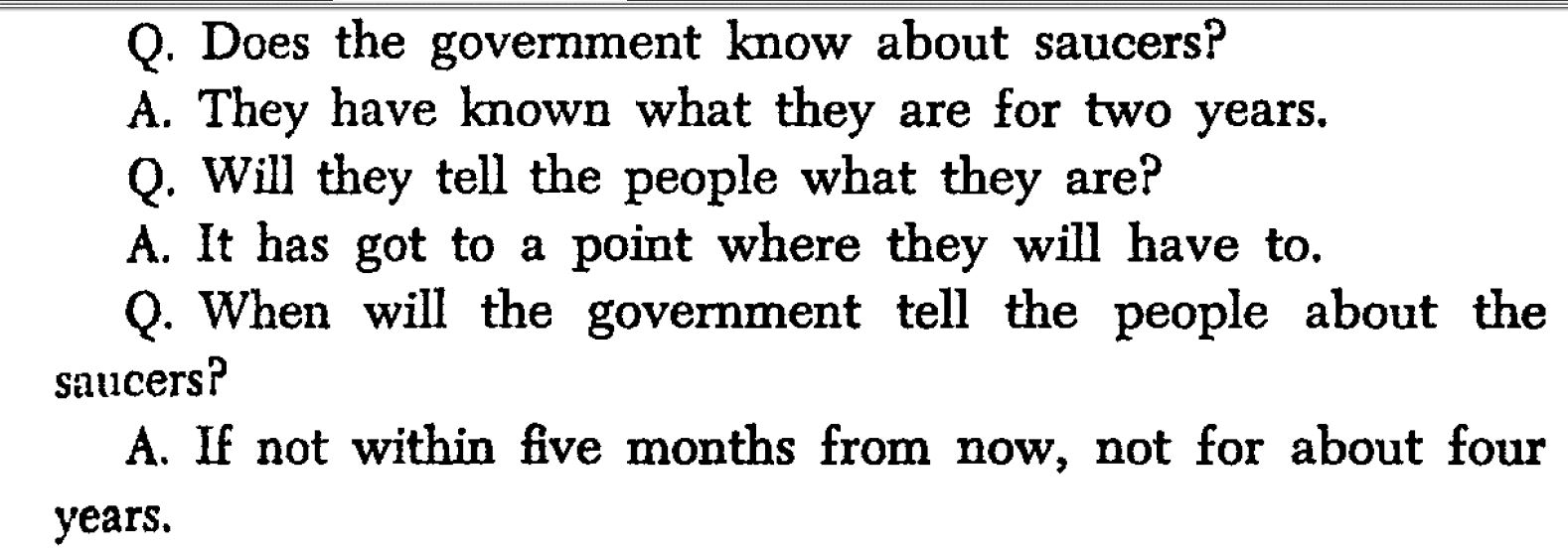
Reported by Gray Barker in his book “They Knew Too Much About Flying Saucers” (1956) in Chapter 8.
Mentioned in an editorial in the FSR Issue for May-June 1957 at page 18, i.e. page 21 of 36 in PDF version.
Mentioned by Jerome Clark in Ronald Story’s book “Encyclopedia of Ufos” at pages 50-51.
Mentioned by Jerome Clark in his “UFO Encyclopedia” (second edition, volume 1 page 153, in the entry entitled “Bender Mystery”).
Mentioned by Martin S Kottmeyer in his article “Still Waiting: A List of Predictions from the ‘UFO Culture’ ”, available online HERE
1957 – Flying Saucer Review
The January/February 1957 issue of the British UFO magazines “Flying Saucer Review” included an editorial (presumably by the editor, Brinsley le Poer Trench) which referred to press coverage of Read-Admiral Delmer Fahrney’s statement that “an intelligence” was guiding flying saucers. The editorial also referred to the publication of Edward J Ruppelt’s book “The Report on Unidentified Flying Objects”.
The editorial included the following:
“Is a big build-up now in motion paving the way for an official announcement of the existence of flying saucers from outer space?”
The editorial concluded that recent events were “all part of a deliberate lead up to the big moment when world authorities will officially tell us that we are not alone in the universe”!
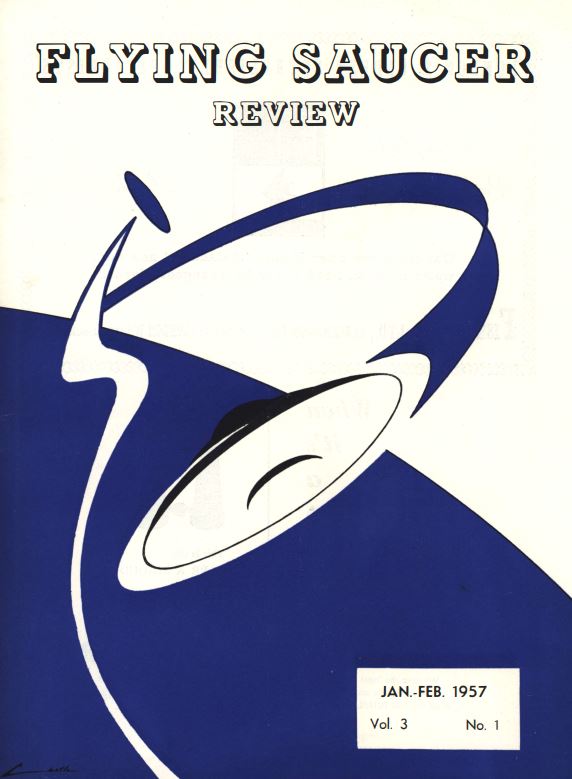
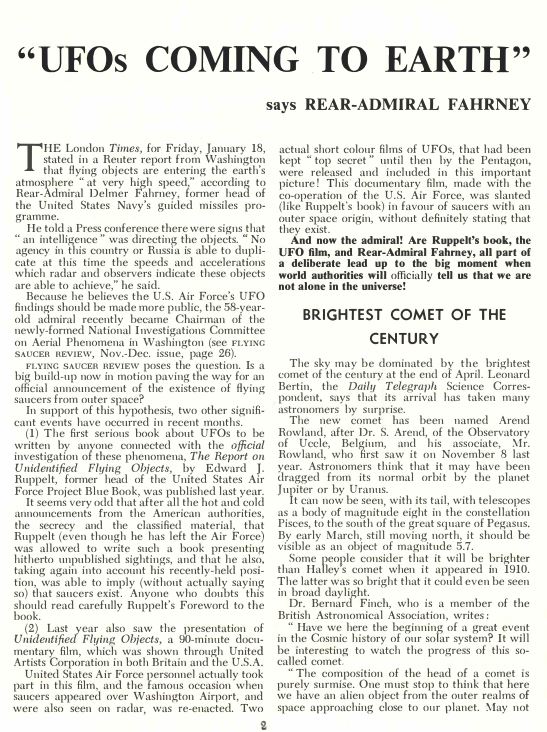
Editorial published in the Flying Saucer Review, January/February 1957 at page 2, i.e. page 5 of 26 in the PDF version.
Discussed in the Flying Saucer Review, May/June 1957 issue at page 18, i.e. page 21 of 36 in PDF version
Mentioned by Philip Klass in his 1977 item "The government will soon reveal the truth about UFOS (But don’t hold your breath”:
www.facebook.com...
1957 – Flying Saucer Review
The May/June 1957 issue of the British UFO magazines “Flying Saucer Review” included an editorial (presumably by the editor, Brinsley le Poer Trench) referred back to the discussion in Gray Barker’s book “They Knew Too Much About Flying Saucers” of Albert Bender’s claim he had been told by Men-In-Black in 1953 that the Government would tell the people about the saucer “if not within five months from now, not for about four years”. The editorial noted that “brings us to 1957!”.
The editorial referred to recent press coverage of UFOs and the publication of Edward J Ruppelt’s book on UFOs, asking “Are all these recent events … just coincidences, or are they indicative of a coming announcement by the authorities that flying saucers from outer space are real?”
The editorial concluded that the recent events “lends credence to the possibility that authorities may shortly announce that saucers exist and that they consider them hostile."
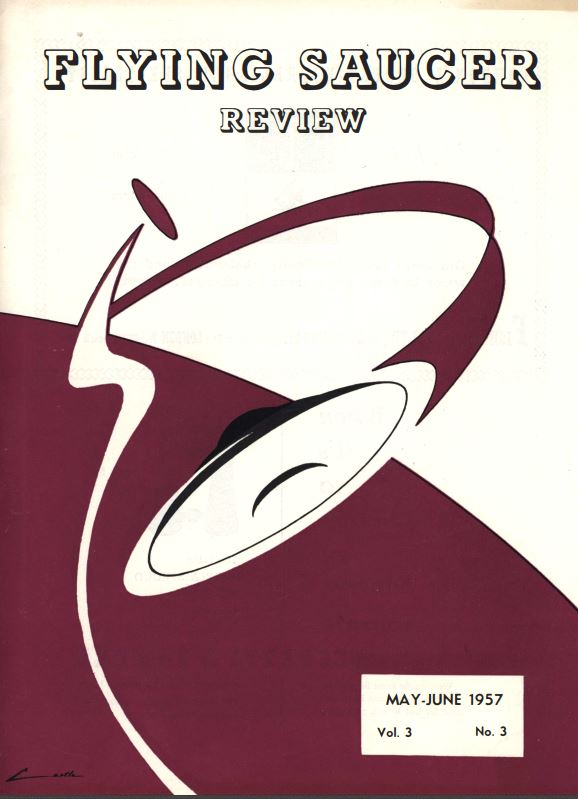
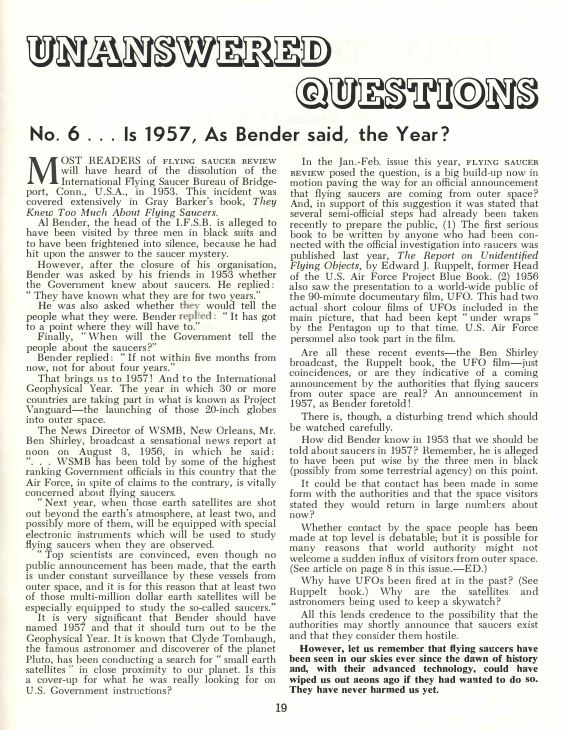
(Editorial in the FSR Issue for May-June 1957 at page 18, i.e. page 21 of 36 in PDF version)
Quoted by Philip Klass in his item "The Cloudy Crystal Ball" in Skeptic UFO Newsletter Number 14 March 1992 at page 8:
centerforinquiry.org...
Mentioned by Martin S Kottmeyer in his article “Still Waiting: A List of Predictions from the ‘UFO Culture’ ”, available online HERE
edit on 20-5-2020 by IsaacKoi because: (no reason given)
1957 – Ben Herrington (reported in “Psychic News”)
“Psychic News” published an item on 22 June 1957 entitled “US Government Know Facts on UFOs”.
That item stated that "The United States Government will tell the public this year that they have been in full possession of the facts concerning Flying Saucers since 1951”.
This prediction was credited to “Spiritualist and author” Ben Herrington.
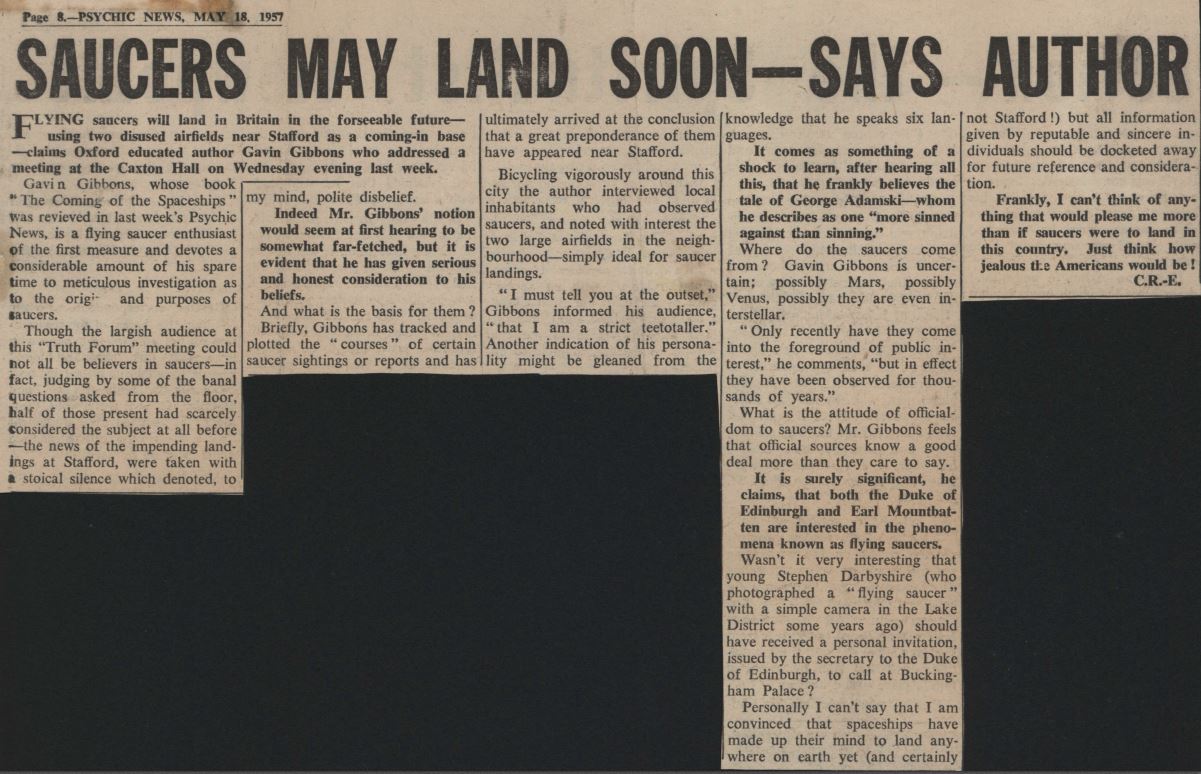
1957 – George Adamski
The best known UFO contactee, George Adamski, wrote a letter to Donald Keyhoe dated 5 August 1957 in which Adamski stated that he was “100%” with Keyhoe “on anything that might bring out the truth”. Adamksi went on to say that “unquestionable sources” had told him that there was a plan to give the people the whole truth within 18 months, stating the following:
“But have you considered that because of our impatience we would be interfering with a plan that may already be laid? I happen to know that there is such a plan – to have the whole truth and nothing but the truth given to the people by our government within the next 18 months. That picture will be far different from the one presently being speculated upon. Wrong procedure, or prematurity, by any group could pigeonhole this entire matter for a much longer period. We must consider all of these phases, if the good we desire is to result. Definite information that this is in the making comes to me from unquestionable sources”.
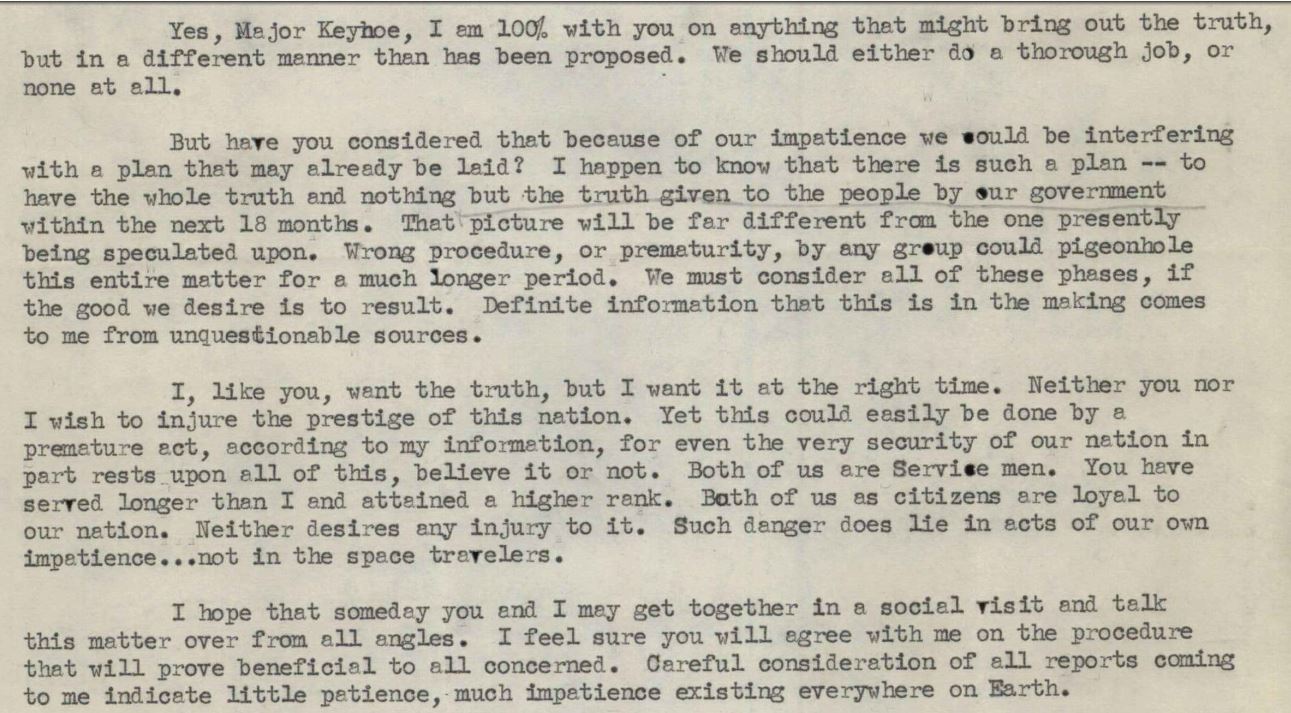
The prediction of disclosure within 18 months was not the only prediction that Adamski made. An FBI memo on George Adamski dated 28 May 1952 mentioned that Adamski had discussed Russia’s developed of the atom bomb and hydrogen bomb and predicted that, among other things, San Diego would be bombed within the next 12 months. (The same memo also mentioned that Adamski had predicted that Russia would dominate the world and we would then have “an era of peace for 1000 years”).

1959 - President of the Manchester Flying Saucer Research Society
In April 1959, the UK publication “Prediction” reported that "Within the next few months the world will be forced to accept the reality of flying saucers", according to a confident prediction by Mr J Dale, the president of the Manchester Flying Saucer Research Society. The motto of that society was “Time will tell”.
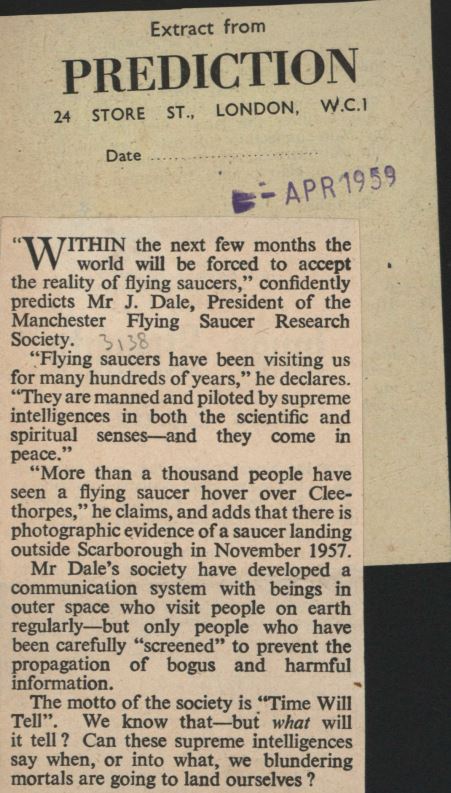
Published in "Prediction", April 1959.
1959 – Frank Edwards
During a discussion with Donald Keyhoe in December 1959 about potential Congressional hearings and putting the best UFO sightings in a “Case For Congress”, Frank Edwards said that “…if Congress doesn’t act this time, we can give those cases to the press. One way or another, it’ll end the cover-up”.
(Reported by Donald Keyhoe in his book “Flying Saucers - Top Secret” (1960) in Chapter 19 at page 261)

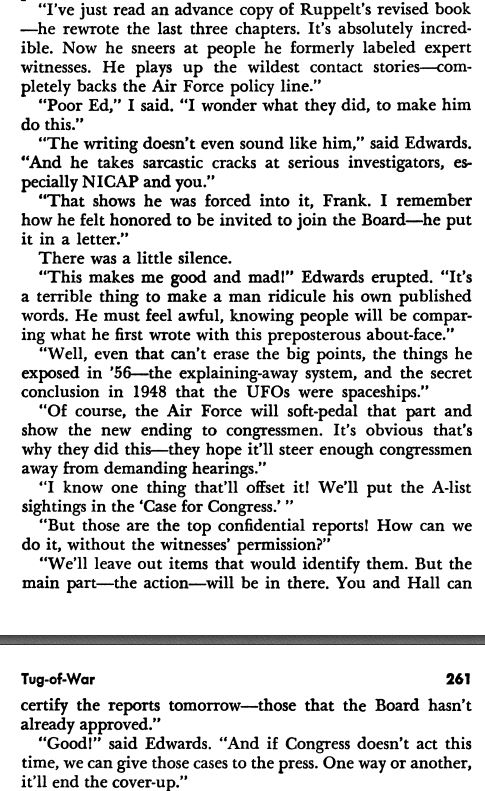
Mentioned by Ulrich Magin in his German-language article "Wir sind knapp davor..." in JUFOF Issue 232 (2017) at pages 112-115 (at pages 18-20 of the PDF version).
1966 – Frank Edwards
In his book “Flying Saucers – Serious Business” (1966), Frank Edwards discussed Air Force explanations of various sightings and suggested that they were not plausible. He also quoted from various newspapers about the credibility of some witness reports. He concluded:
“After more than nineteen years, the UFO’s are with us in greater numbers than ever.
At long last the American press and the American public are demanding to know what the Defense Department knows about these strange craft and their strange operators.
The Defense Department is clinging doggedly to its policy of pretending to ignore a problem which it really considers very serious.
The day of the denouement cannot be far away.
The time may be shorter than we realize.
…
It is my personal belief that the day is not far distant when these questions will be answered for us”.
(The relevant discussion by Frank Edwards is in his book “Flying Saucers – Serious Business” (1966) in Chapter 13 at pages 313-314).
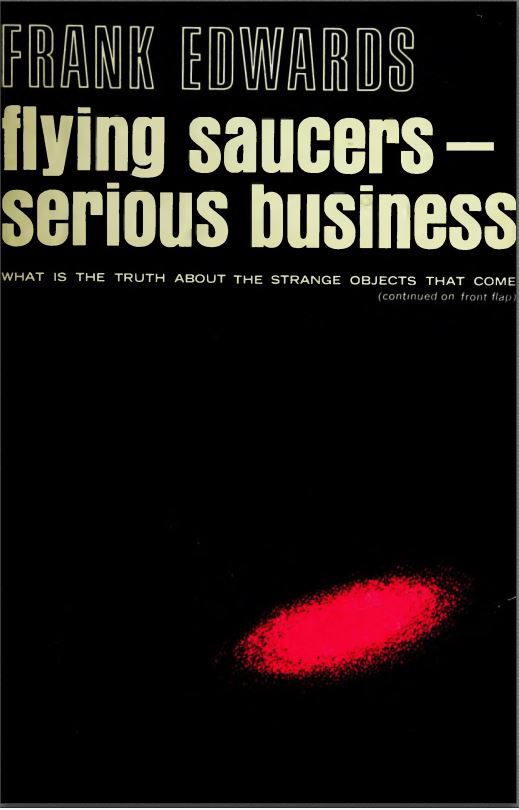
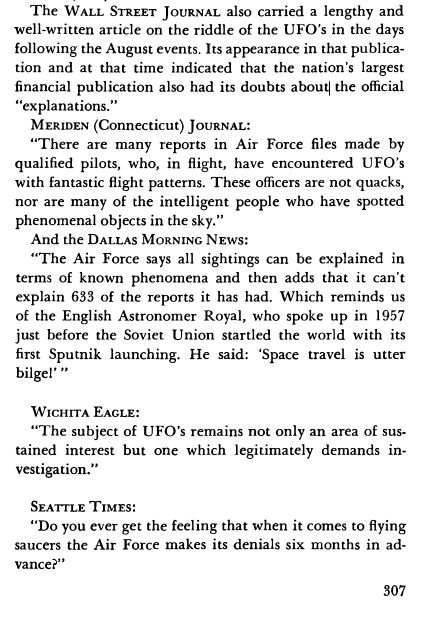
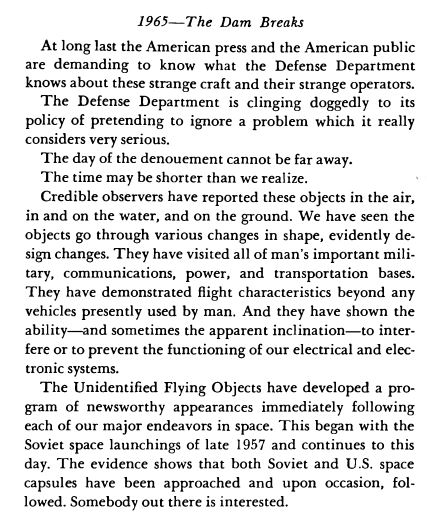
Mentioned by Philip Klass in his 1977 item "The government will soon reveal the truth about UFOS (But don’t hold your breath”:
www.facebook.com...
edit on 20-5-2020 by IsaacKoi because: (no reason given)
1968 – Stan Friedman
Stanton Friedman was reported in the Times Herald on 29 September 1968 as stating that “scientists and military men were about to ‘lift the laughter curtain’ and reveal that flying saucers are real”.
(Reported in the Times Herald on 29 September 1968, in an article entitled “Expert Predicts UFO Admissions)
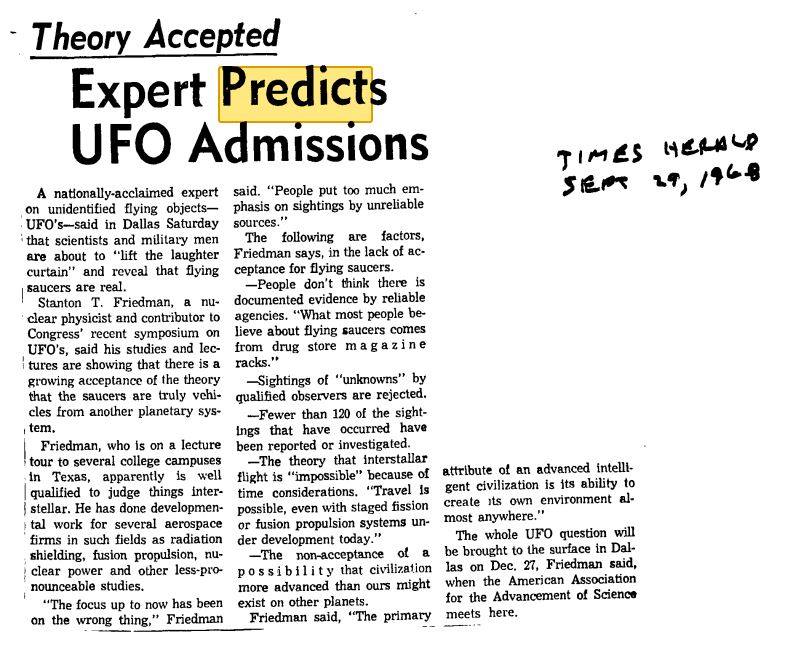
1974 – Jeane Dixon (American psychic)
On 19 May 1974, the National Enquirer posted a front-page headline on a claim by psychic Jeane Dixon that “the secrets of UFOs will be revealed in the near future”.
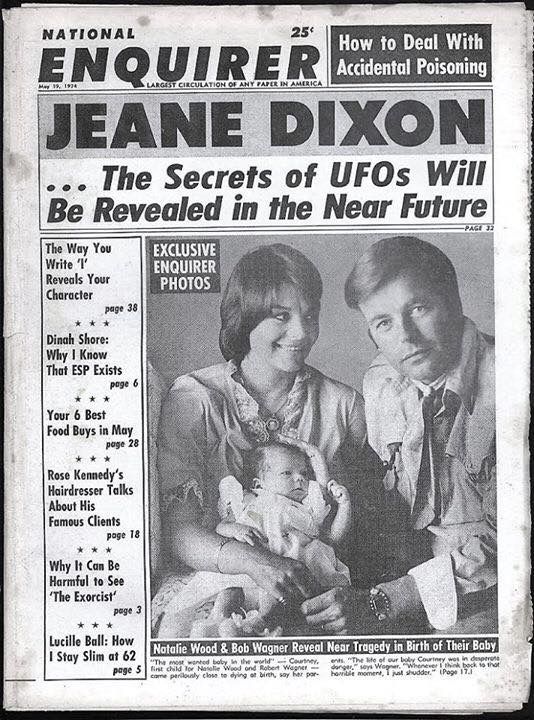
Another UFO prediction by Jeane Dixon featured in the National Enquirer in a subsequent article on 5 November 1974.
Jeane Dixon made about UFO prediction in 1976. The 14 September 1976 issue of the National Enquirer reported that "Jeane Dixon, the world's most phenomenal seer, says a UFO carrying super- advanced humans from a hidden planet will land on Earth within a year-· and will help us overcome all disease, starvation and war”.
Jeane Dixon also predicted in 1976 that “Aliens… will begin trans¬mitting their secrets to us no later than August, 1977”.
Jeane Dixon discussed some of her UFO predictions with William Shanter in “Mysteries of the Gods” (1977) at 1 hour 16 minutes 51 seconds into the video embedded below:
Quoted by Philip Klass in his item "The Cloudy Crystal Ball" in Skeptic UFO Newsletter Number 14 March 1992 at page 8:
centerforinquiry.org...
Mentioned by Martin S Kottmeyer in his article “Still Waiting: A List of Predictions from the ‘UFO Culture’ ” (citing Hayden Hewes wrote an article entitled "Jeanne Dixon's Ufo Visions" in ESP 2, #2 March 1977 at pages 50, 57-58.), available online HERE
Mentioned by Curt Collins in his article “PSI ‘74: Psychics and the UFO Witness from Pascagoula” at:
thesaucersthattimeforgot.blogspot.com...
Jeane Dixon has not been the only American psychic to make predictions about UFOs. In 1977, Timothy Green Beckley wrote to various psychics asking questions about UFOs. He summarised the responses in his article "Famous Psychics Reveal Key to the Ufo Phenomenon" Ufo Report September 1977 at pages 52-56. The conclusion noted:
“…all 10 psychics—despite conflicting opinions on the nature of the phenomena—seem to agree on a few major points:
a) UFO activity is increasing and sightings will become more commonplace;
b) the next two decades will see major changes on Earth—as a result of contact with the intelligences behind these craft; and,
c) alien entities will make themselves known in the near future. and—as the telepathic messages from these psychics seem to indicate—will help educate and enlighten mankind.
If there’s a timetable to this, it looks as if the opening phase—a sharp up- surge in UFO activity all over the world—is well underway. All we can do now is wait and see if the psychics other predictions will also prove true”.
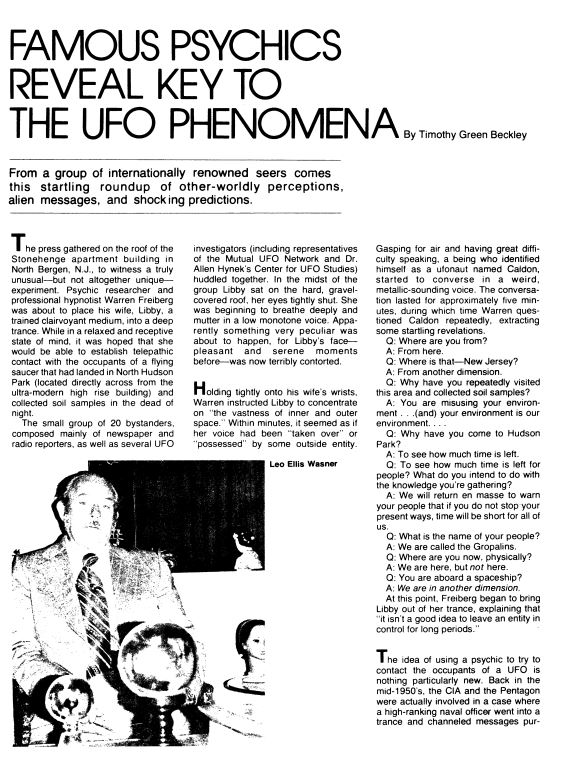
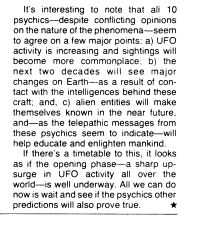
edit on 20-5-2020 by IsaacKoi because: (no reason given)
1974 – L J Lorenzen (of APRO)
The Milwaukee Journal included an article entitled “US to accept existence of space visitors?” on 21 July 1974. That article reported on claims by Lorenzen, of the UFO group APRO, that the US government was about to launch a campaign to prepare the work to accept extraterrestrial visitors. It quoted Lorenzen as stating:
“I predict that that within six months – possibly as little as three months – it will be obvious the official position has undergone a 180 degree reversal”.
He said that one reason for this might be “the fear that other nations might beat us out in announcing the reality of extraterrestrial visitors”.
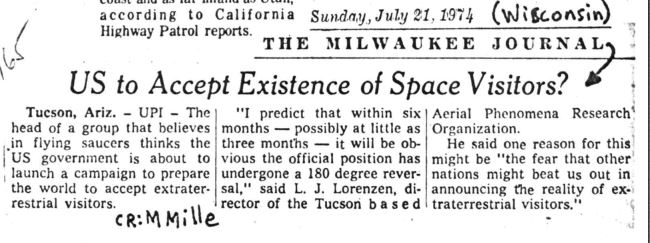
Similar claims by L J Lorenzen were reported on 25 August 1974 in “The National Tattler” in an article entitled “Defense Dept. Readies Report Admitting That UFOs Actually Exist”. That article reported that Lorenzen had said that the U.S. Defense Department had decided to acknowledge that flying saucers from other planets do exist. It stated that “The announcement will be made during the next several months and could come much sooner, because of the rapidly increasing number of documented UFO incidents”. Lorenzen was quoted as stating that:
“A program has been undertaken that will over the next few months make it obvious that the government bas reversed its position ... My information is that the government will release all its [UFO] information within the next three years.
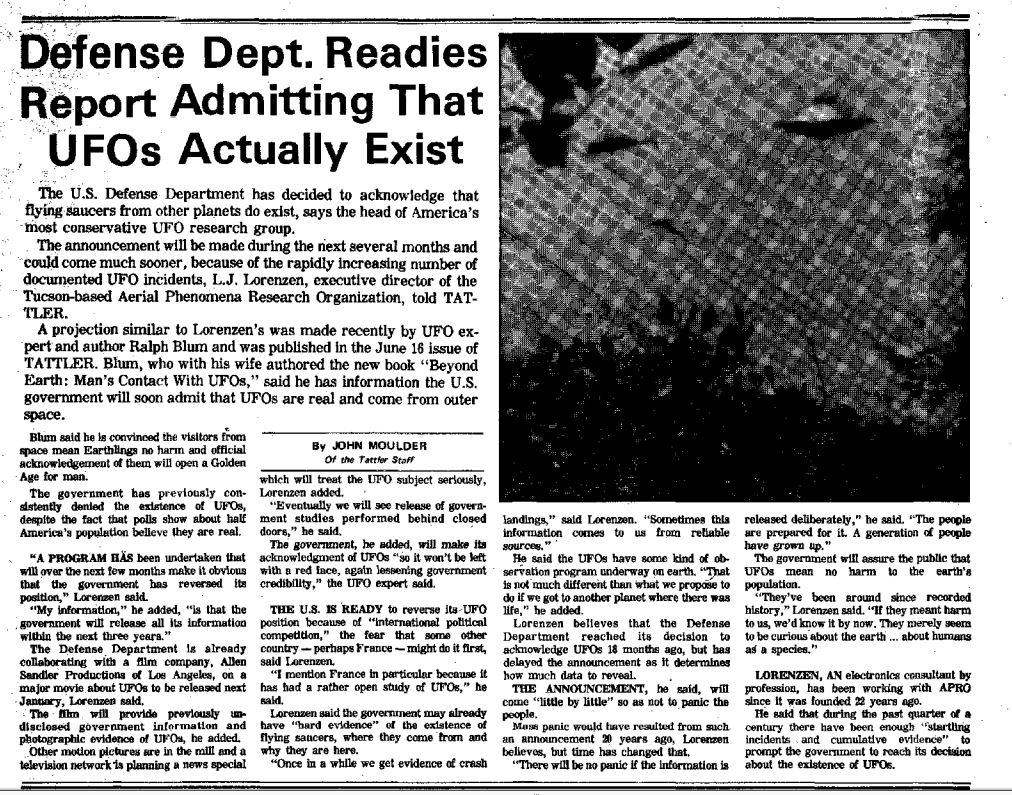
That National Tattler article also reported that the Defense Department was “already collaborating” with a film company, Allan Sandler Productions of Los Angeles, on a major movie about UFOs. I presume that this was a reference to the documentary produced by Allan Sandler and Robert Emenegger. The stories surrounding that documentary are worth a separate thread...
Leonard Stringfield later reported (in his book “Situation Red: The Ufo Siege” (1977) at pages 185-186) that Jim Lorenzen had commented on his earlier prediction as follows:
“A few years ago (at the APRO symposium in Littleton, Colorado, July 1974), I predicted that government sources would begin to ease up on UFO information, making it more accessible than in the past. I predicted that this would take place through a gradually accelerated program over a three-year period. I was wrong. Essentially the same information had been leaked to me through three separate channels, giving me confidence that I was onto something real. In retrospect I feel either that I was ‘set up,’ i.e., fooled into thinking I was onto something real, or that such a plan did exist but has since been reversed”.
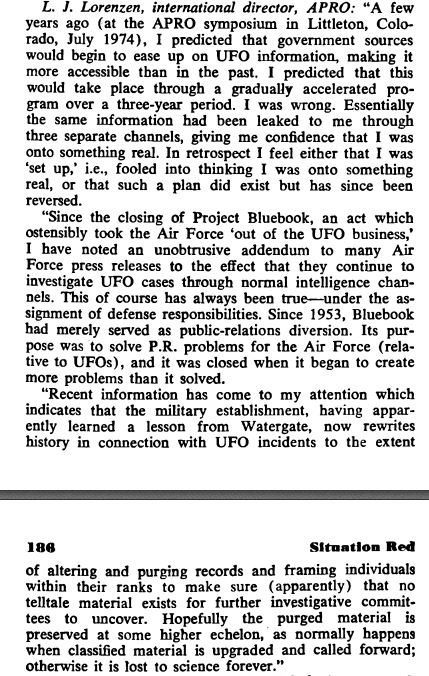
Mentioned by Philip Klass in his item "The Cloudy Crystal Ball" in Skeptic UFO Newsletter Number 14 March 1992 at page 8:
centerforinquiry.org...
Mentioned by Martin S Kottmeyer in his article “Still Waiting: A List of Predictions from the ‘UFO Culture’ ”, available online HERE
edit on 20-5-2020 by IsaacKoi because: (no reason given)
1974 – National Examiner
On 9 December 1974, “National Examiner” published an item which included the following:
"Insiders at the nation's capital feel that the government is almost ready to release some of the information it has reportedly withheld from the public for 25 years concerning extraterrestrial life ... The super coverup -- concerning UFOs- -makes the White House's Watergate mess look like a high school affair”
Quoted by Philip Klass in his 1977 item "The government will soon reveal the truth about UFOS (But don’t hold your breath)”:
www.facebook.com...
Quoted by Philip Klass in his item "The Cloudy Crystal Ball" in Skeptic UFO Newsletter Number 14 March 1992 at page 8:
centerforinquiry.org...
1974 – Ralph Blum and Judy Blum
In a preface to their book “Beyond Earth : Man’s Contact with UFOs” (1974), Ralph and Judy Blum stated : “We predict that by 1975 the government will release definite proof that extraterrestrials are watching us." In Chapter 19, they referred to “signs of a change in official attitude towards the Phenomenon” and the “intriguing rumour … that the Pentagon is covertly supporting a series of films for TV that will tell us UFOs are real”.
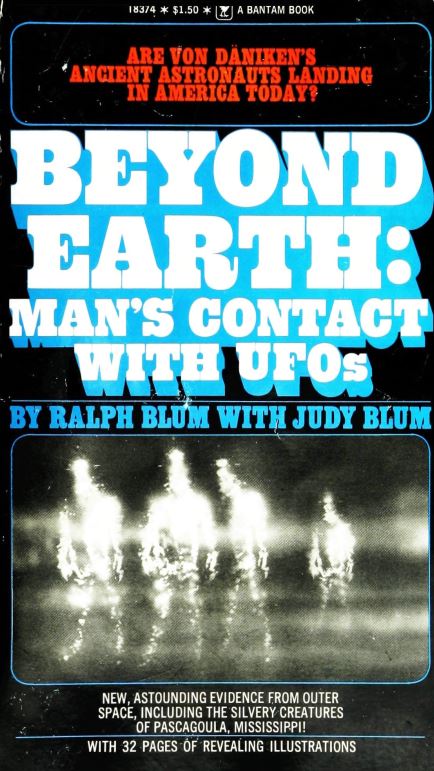
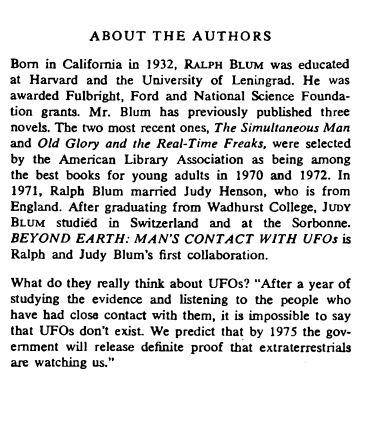
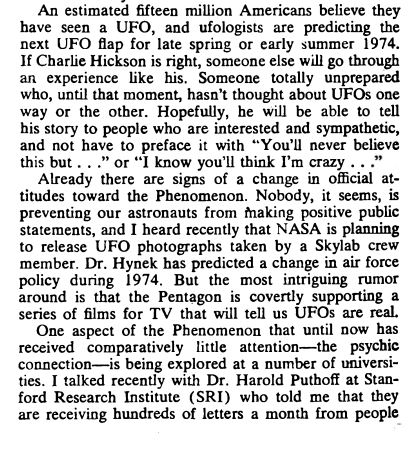
Quoted by Philip Klass in his item "The Cloudy Crystal Ball" in Skeptic UFO Newsletter Number 14 March 1992 at page 8:
centerforinquiry.org...
Quoted by Robert Sheaffer in his article “ ‘UFO Disclosure’ Happening Again This Year” in the Skeptical Inquirer (Volume 40 Issue 6 at pages 16-17):
skepticalinquirer.org...
Mentioned by Martin S Kottmeyer in his article “Still Waiting: A List of Predictions from the ‘UFO Culture’ ”, available online HERE
edit on 20-5-2020 by IsaacKoi because: (no reason given)
1974 - Roscoe Drum¬mond
On 30 October 1974, syndicated columnist Roscoe Drummond wrote that “UFO’S are in the news again and with mounting evidence that they are real, not imaginary . . . the time is getting near when the US. Air Force will have to abandon its longstanding tactic of concealment or be repudiated by the Department of Defense”.
Quoted by Robert Sheaffer in his article “ ‘UFO Disclosure’ Happening Again This Year” in the Skeptical Inquirer (Volume 40 Issue 6 at pages 16-17):
skepticalinquirer.org...
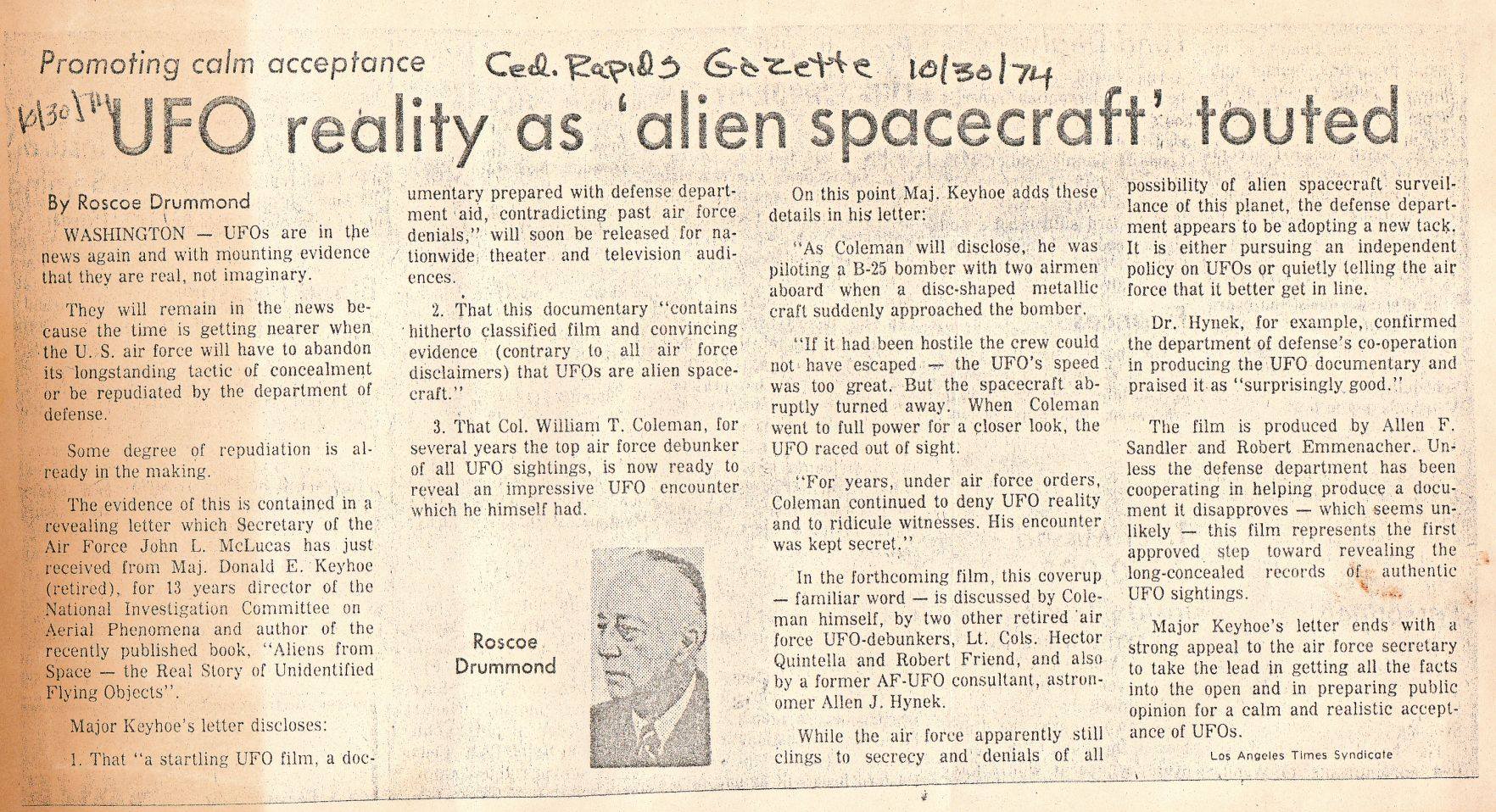
Article by Roscoe Drummond published in the “Los Angeles Times” Syndicate, October 30, 1974. Robert Sheaffer kindly provided me with a copy.
1974 - Robert S Carr
On 16 October 1974, the Tampa Tribune included an article entitled “End of UFO ‘Coverup’ seen by Christmas” about a claim by UFO investigator Robert Spencer Carr that “Five weeks ago I heard from the highest authority in Washington that before Christmas the whole UFO cover-up will be ended”. He stated that “There will be public admission that the UFO’s always have been real, and that for the past 25 years the United States government and the Air Force have known they were piloted by human-like beings”.
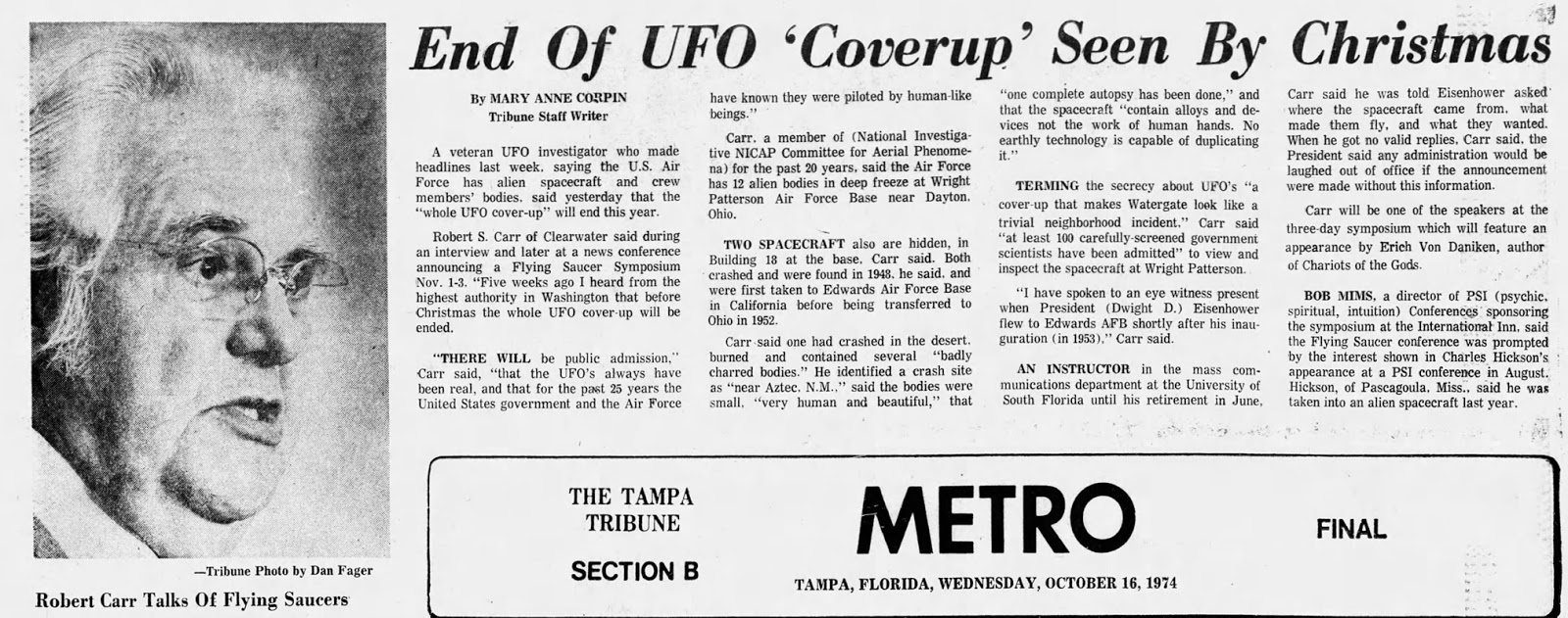
Mentioned by Robert Sheaffer in his book “Ufo Sightings: The Evidence” (1998) at pages 168-169.
Mentioned by Curt Collins in his article “UFOlogy 1974: The Flying Saucer Symposium in Tampa”:
thesaucersthattimeforgot.blogspot.com...
Mentioned by Martin S Kottmeyer in his article “Still Waiting: A List of Predictions from the ‘UFO Culture’ ”, available online HERE
edit on 20-5-2020 by IsaacKoi because: (no reason given)
1974 - Charles Hickson
In a 1974 interview, Charles Hickson (the 1973 Pascagoula UFO incident witness) said, "... think that they [the Air Force] have definite proof that other worlds and beings do exist. And I think that before this year is out, and I say this with some reservation, but I think before the year is out, that our government—particularly our Air Force—is going to come out to the American people and tell them that these things [UFOs] do exist.”
Quoted by Robert Sheaffer in his book “Ufo Sightings: The Evidence” (1998) at page 168 (citing WWDC Radio, Washington, D.C., November 14, 1974)
Mentioned by Martin S Kottmeyer in his article “Still Waiting: A List of Predictions from the ‘UFO Culture’ ”, available online HERE
In 1983, Gray Barker reported that Charles Hickson had claimed to have had “further contact with the aliens” and that “he has been chosen as one of 12 people who will serve as liaison between the aliens and the people of Earth”. Hickson reportedly claimed that the beings will arrive in 1984, stating that “By 1984 we’ll be softened enough and changed from our bad ways. They are coming down to see what they have accomplished”.
Quoted Gray Barker in his booklet “Gray Barker’s UFO Annual – 1983”.
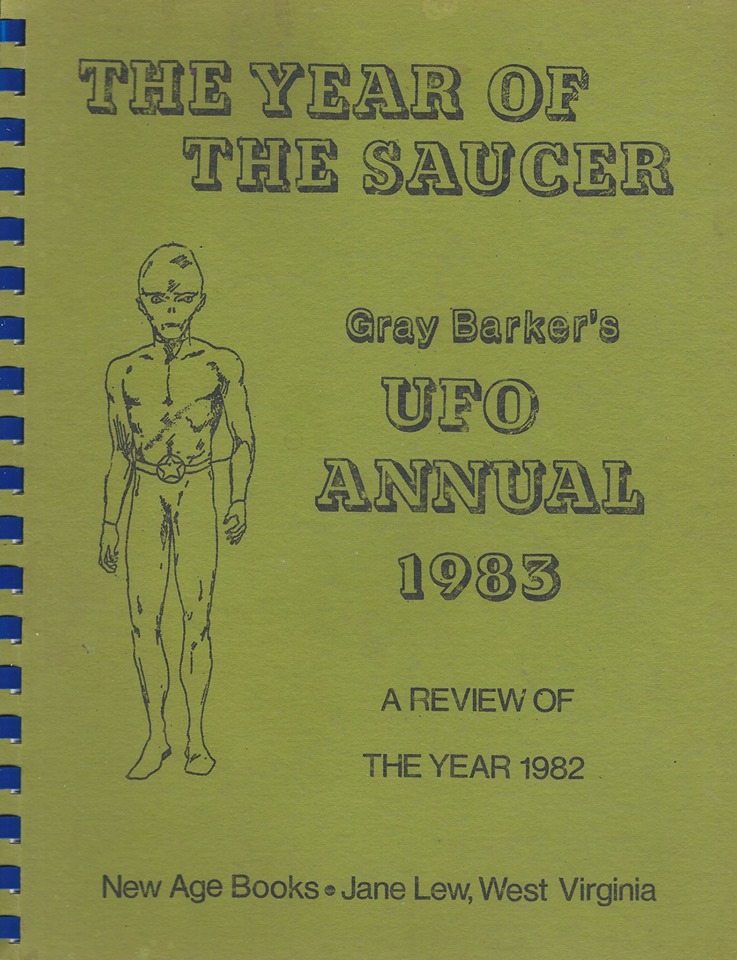
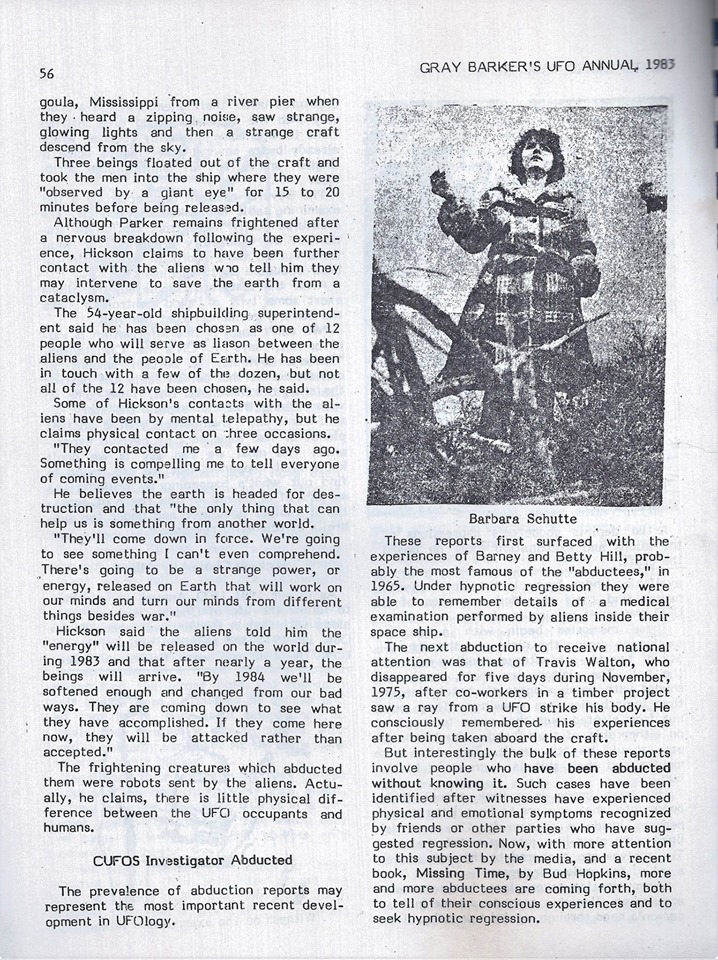
edit on 20-5-2020 by IsaacKoi because: (no reason given)
new topics
-
Why isn't Psychiatry involved?
Social Issues and Civil Unrest: 2 hours ago -
Help in song interpretation
Music: 4 hours ago -
FEMA Head Admits Agency Skipped 20 Homes with Trump Signs
Mainstream News: 6 hours ago -
Yet another Hack...
Rant: 7 hours ago -
Gaetz ethics investigation results "hacked".
US Political Madness: 11 hours ago
top topics
-
UK to scrap warships, military helicopters and fleet of drones to save money
Regional Politics: 16 hours ago, 13 flags -
Yet another Hack...
Rant: 7 hours ago, 12 flags -
FEMA Head Admits Agency Skipped 20 Homes with Trump Signs
Mainstream News: 6 hours ago, 12 flags -
U.S. Closes Kyiv Embassy Over ‘Significant Air Attack’ Intelligence
World War Three: 15 hours ago, 10 flags -
Gaetz ethics investigation results "hacked".
US Political Madness: 11 hours ago, 10 flags -
Help in song interpretation
Music: 4 hours ago, 1 flags -
Why isn't Psychiatry involved?
Social Issues and Civil Unrest: 2 hours ago, 0 flags
active topics
-
-@TH3WH17ERABB17- -Q- ---TIME TO SHOW THE WORLD--- -Part- --44--
Dissecting Disinformation • 3331 • : brewtiger123 -
Russia Ukraine Update Thread - part 3
World War Three • 6834 • : FlatBatt -
Why isn't Psychiatry involved?
Social Issues and Civil Unrest • 3 • : berbofthegreen -
Help in song interpretation
Music • 1 • : FullHeathen -
President-Elect DONALD TRUMP's 2nd-Term Administration Takes Shape.
Political Ideology • 226 • : WeMustCare -
FEMA Head Admits Agency Skipped 20 Homes with Trump Signs
Mainstream News • 10 • : BingoMcGoof -
U.S. Closes Kyiv Embassy Over ‘Significant Air Attack’ Intelligence
World War Three • 40 • : annonentity -
RFK is Trumps health pick
2024 Elections • 14 • : WeMustCare -
Well, here we go red lines crossed Biden gives the go ahead to use long range missiles
World War Three • 310 • : Imhere -
Congress 2024 - We do not want me in our ladies rooms
US Political Madness • 20 • : WeMustCare
